UW honors the best of 1997
The UW honors the best teachers, TAs and public servants of the year.
From a computer animation wizard to the woman who put fetal alcohol syndrome on the map, from a scion of one of Seattle’s oldest African-American families to a immigrant fresh from Ireland, these are the best UW teachers and volunteers of the year. Six of them are UW professors chosen by a panel of faculty, students and alumni as the top teachers of the year. Two are teaching assistants named by the same panel. Three represent the best in public service to the University and the community.
Robert Stacey
Distinguished Teaching Award
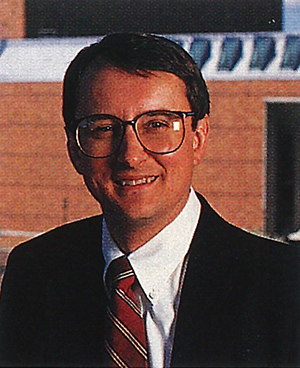 History Professor Robert Stacey started out to be an attorney. What changed his mind was a good teacher—and an interesting subject.
History Professor Robert Stacey started out to be an attorney. What changed his mind was a good teacher—and an interesting subject.
While earning a bachelor’s degree at Williams College in Massachusetts, Stacey took a class in medieval history from an extraordinary professor. Dropping law for history, he went to Oxford University for graduate training. Although Oxford is not known as a center for Jewish studies, it was there that Stacey found his niche—the study of English Jews in the Middle Ages.
At first glance, it may seem to be an esoteric subject, but Stacey finds lessons for modern times in the Middle Ages. It was a period when nationalism was on the rise and tolerance for differences took a nose-dive. Minority groups, including Jews and homosexuals, were persecuted and expelled from the burgeoning nation-states. Even Nazi racial ideology has roots in the 13th century, he says.
Stacey’s reputation for scholarship has earned the history professor the position of chair of Jewish studies in the Jackson School for International Studies. He is one of only two non-Jewish academics in the country to hold a similar position.
His reputation for teaching has earned him a 1997 Distinguished Teaching Award. “I’ve had a lot of good teachers to watch over the years,” Stacey says of his success. “As a student I’d observe my instructors and think, `If I get the chance, I’ll do that,’ or `I’ll never do that.’ It was a great way to learn.”
He teaches a variety of courses on the Middle Ages, including the large lecture class History 112, “The Medieval World.” Whatever the subject, he is known as a tough grader. Stacey says he doesn’t give grades—he gives students motivation to rise above what they initially thought they could accomplish.
“It is too easy to sell students short, to give them high marks when they are not really performing at their best,” he says. “Students have a right to find out how well they can do. I tell them, `You are bright and capable of doing more than this.’ ”
Tough grading doesn’t drive these students away. One nomination letter describes Stacey as “the very rare example of one who excels as a teacher at every level of teaching: entry, upper division and graduate.”
Stacey disagrees with those who claim the quality of college students is declining. “In my large lecture classes, if I don’t have first-class teaching assistants, I can’t have a first rate class,” Stacey says. “The quality of graduate student has increased in the eight years I’ve been here, and I think the quality of undergraduate writing has improved.”—Nedra Floyd Pautler, UW Office of News and Information
Robert Crutchfield
Distinguished Teaching Award
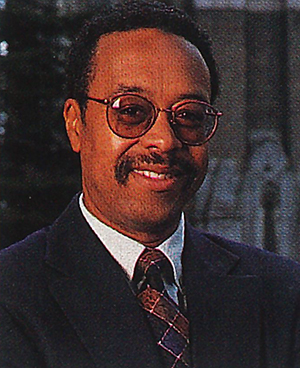 Bob Crutchfield wears a lot of hats—teacher, scholar, role model, mentor—and they all fit well.
Bob Crutchfield wears a lot of hats—teacher, scholar, role model, mentor—and they all fit well.
It’s not surprising then that the associate professor of sociology is one of the recipients of the University’s 1997 distinguished teaching awards. As Sociology Chair Charles Hirschman said in supporting Crutchfield’s nomination for the award:
“He is one of the few faculty members who does it all — teaching, scholarship, mentoring students, service to the University and to the broader profession — and he does it with grace and aplomb. In a department with a tradition for excellence in teaching, Bob Crutchfield stands out as one of our stars. He teaches large classes of 300-plus students and medium- size seminars of 40, drawing rave reviews in all of them.”
Crutchfield arrived at the University of Washington 18 years ago and has made important contributions toward improving teaching throughout his career. He is one of the founders of Large Lecture Instructors, an informal group for people who teach the biggest classes on campus, and other programs to help teachers.
“Bob has dedicated himself to changing the culture and quality of teaching at this university,” says a colleague . “His commitment to helping others improve their teaching is unparalleled among the faculty.”
Crutchfield graduated from a small Pennsylvania institution, Thiel College, and his original plan was to earn his master’s degree in sociology and then teach at a small college. Instead, he became fascinated with doing sociological research at Vanderbilt University, earning a Ph.D. His teaching plans regained center stage when he was hired by the UW in 1979.
Throughout his career at the UW, Crutchfield has taught large classes and has mastered the art of keeping the attention of the overwhelming majority of up to 450 students
“One thing I try is to find a way to `shrink’ classes because the students don’t like large ones,” he explains. “I don’t assume I can’t have a discussion because there are 300 people in the room. I try to interact with students.”
One of the ways he foster interaction is through the use of one-minute essays. Near the end of a class, he’ll ask his students to summarize the main points of a lecture or discussion, to answer a question he poses, or to ask questions of him. The essays are ungraded, but students are expected to turn them in and Crutchfield reads them.
“The essays are an opportunity to find out where my students are and if they get my main point. They also give students who won’t speak up before several hundred people a chance to say something to me each day,” he says.
Crutchfield also has played a significant role in mentoring minority students. “I never had a black instructor when I was a student, because there weren’t any in my field. Being a model is an important contribution I can make. But a larger issue is that scholarship runs deep in African people, so it is important for majority students to see Africans and other minorities as scholars and that they see that scholarship is a universally valued tradition,” he says
“I hope I can be a role model for Latino, Asian, Native American and white students, as well as for African students. A lot of students of color need minority role models, but we shouldn’t be too narrow in who should be role models for whom,” he adds. “Diversity is very important.” —Joel Schwarz, UW News and Information
Douglas Paauw
Distinguished Teaching Award
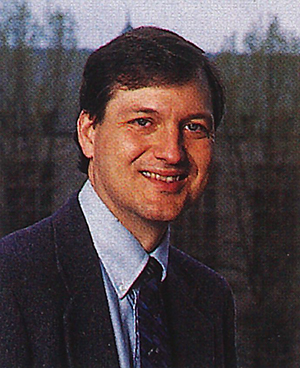 Medicine Professor Douglas S. Paauw, recipient of a 1997 Distinguished Teaching Award, knew very early that he wanted to be a teacher. As a kindergartner, he recalls reading a book about snakes and being fascinated by them. He read more and was soon making presentations about snakes to his classmates.
Medicine Professor Douglas S. Paauw, recipient of a 1997 Distinguished Teaching Award, knew very early that he wanted to be a teacher. As a kindergartner, he recalls reading a book about snakes and being fascinated by them. He read more and was soon making presentations about snakes to his classmates.
“We went around to other schools, and I remember the feeling that if I knew something, I wanted to share it,” he says. In high school he organized study groups in his classes, and in college, he was a teaching assistant.
This latest honor is one of many. Paauw, who also received a teaching award from this year’s graduating class at the medical school, will become a medical school Teacher Superior in Perpetuity. At 39, he is among the youngest at the UW to have received such status.
The key to good teaching, says Paauw, is to focus on what the student wants to learn and not about what you want to teach. Also, it is important to be an active demonstrator in the class, and check frequently with the students about what they do or don’t understand.
“It’s about enjoying it, as well,” he says. “Our real goal is to create lifelong learners.
“The part I enjoy the most is seeing the students take what they are learning, and then teach it to someone else,” Paauw says.
Paauw was the first clinical educator hired in the Department of Medicine’s Division of Internal Medicine. He dedicates most of his time to patient care and teaching, and about 20 percent toward HIV research. “I don’t think I would have been happy in a career that didn’t heavily involve teaching,” he says.
As a primary-care doctor, it isn’t unusual for Paauw to visit his HIV patients in their homes. He says that when he started his career in the early ’80s, HIV was unknown. That, and the fact that the disease was targeting and striking down people his own age, were the reasons he became involved in the field.
“It’s a disease that takes over the whole body. As general internists, we’re trained to work on the whole body,” Paauw says.
Teaching runs in Paauw’s family. His mother is an elementary school teacher, his father, a retired Harvard and Yale economics teacher, and his brother teaches English in Indonesia.
Paauw graduated first in his class from Macalester College in 1980 with a degree in biology. He received his doctorate in medicine from the University of Michigan in 1985, where he was also first in his class.
Since 1989, Paauw has been an attending physician at the UW Medical Center and Harborview. In 1990 he became an assistant professor, and in 1995 an associate professor of medicine.
In 1994, he received the Margaret S. Anderson Award for exceptional concern for and support of medical students.
Paauw will address the 1997 graduating class of the medical school during the Investiture of Doctoral Hoods and Physician’s Oath Ceremony Saturday, June 7, in Seattle.—Will Morton, Health Sciences News and Community Relations
David Salesin
Distinguished Teaching Award
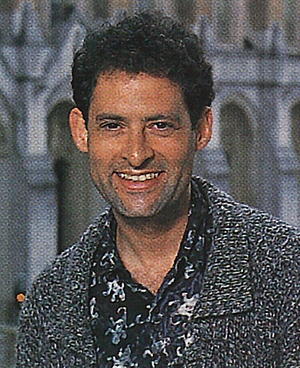 Students who enroll in David Salesin’s undergraduate computer graphics class should beware: Their lives may never be the same.
Students who enroll in David Salesin’s undergraduate computer graphics class should beware: Their lives may never be the same.
Take Brad West, who signed up for the course as a junior in 1995. He showed flair and the next thing he knew he was a TA in the class. Later that year, he joined Salesin’s research group and things really got interesting.
Working with Salesin and two graduate students, West helped invent a revolutionary process for printing photorealistic images with just two colored inks instead of the traditional and more expensive four-color process. He co-authored a research paper on the project that was accepted at a major international conference and found himself giving the presentation before thousands of top computer graphics professionals.
As a senior, West helped teach Salesin’s new, multidisciplinary course on computer animation. Upon graduating, he was heavily recruited to work for Pixar Animation Studios, the Oscar-winning producers of last year’s hit movie Toy Story. And to top it all off, the duotone printing process he helped develop recently was licensed by a local startup company.
That’s the kind of student success story many professors would feel lucky to be a part of once in their careers. But Salesin has produced many success stories since arriving at the UW as an assistant professor of computer science and engineering in 1992. His students have gone on to the best graduate programs in the field, plum faculty posts at Ivy League universities and jobs with top computer graphics companies. For his outstanding teaching abilities, Salesin is a winner of a 1997 Distinguished Teaching Award.
“I have never encountered a professor that comes close to his quality of mentoring, especially for undergraduates” said one former student now at Stanford.
Salesin, 36, claims only to be doing what makes sense and comes naturally. To some degree, he said, he is modeling his own undergraduate experience under Brown University Professor Andries van Dam. The Brown professor treats his teaching and research assistants—including undergraduates—as full partners in planning and conducting research, writing and presenting papers and innovating in the classroom.
“Using undergraduates as TAs just makes sense,” Salesin explains. “The best way to make sure you’ve really learned the material is by helping others to learn it, so it’s a great way to cement their knowledge of the course. Plus, they see it as an honor and an opportunity so they’re enthusiastic and work hard.”
When he finds students whose talents and interests are a good match for one of his research ideas, Salesin assembles a team of two or three students to tackle the project and guides their work. When the ideas reach fruition, Salesin helps the students write up the research for publication and later coaches them for their presentations.
Last year, Salesin set a record by having eight out of eight submitted papers accepted for publication at SIGGRAPH, the premier international conference for computer graphics. Four were co-authored and presented by undergraduates.
But its not the publications or the awards that drive Salesin’s research regimen. It’s the teaching, he says.
“Being a teacher is kind of like being a parent,” he explains. “It’s enormously satisfying to watch students grow and, through their own hard work gain confidence and skills to eventually go off and do it on their own.”—Greg Orwig, Office of News and Information
Cherry A. McGee Banks
Distinguished Teaching Award
UW Bothell honored Education Professor Cherry A. McGee Banks for her “ability to challenge her students within a supportive atmosphere.” The awards committee noted her innovative teaching methods and her ability to use a multicultural approach to teaching education.
“UW Bothell is indeed fortunate to have Professor Banks as a member of its faculty,” says UWB Dean Norman Rose. “This award, given every year, is a clear indication of the value UWB places on excellence in teaching.”
Banks received her bachelor’s degree in 1968 from Michigan State University. She earned a master’s in education in 1977 and a Ph.D. in 1991, both from Seattle University.
Janet Primomo
Distinguished Teaching Award
UW Tacoma named Nursing Professor Janet Primomo, ’82, ’89, as its 1997 top teacher. As part of Tacoma’s nursing program, Primomo has developed and taught courses in the area of community health and policy.
Her professional and community activities include serving on boards and advisory committees of such organizations as the Tacoma-Pierce County Health Department, Group Health Cooperative and the editorial advisory board of Public Health Nursing.
“Professor Primomo’s dedication to interactive teaching, her passion for her work and her commitment to encouraging active, lifelong learning exemplifies the qualities of excellent university teaching. Her ongoing efforts to explore her field even further hone her teaching methods to accommodate the unique needs of the typical UWT student are truly worthy of recognition,” says UWT Dean Vicki Carwein.
Primomo received her master’s and doctorate in nursing from the UW Seattle campus. She earned her B.S. in nursing in 1975 from Russell Sage College in Troy, N.Y.
Emer Dooley
Excellence in Teaching
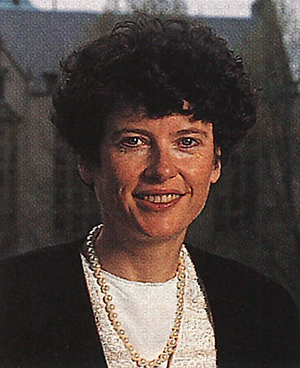 When Emer Dooley decided to become a professor and teacher, she asked herself, “How hard can it be?”
When Emer Dooley decided to become a professor and teacher, she asked herself, “How hard can it be?”
After all, she was used to the fast-paced, challenging world of the computer industry, where she worked as an engineer and in marketing. Her presentations typically were interrupted with pointed questions, her reasoning subjected to scrutiny.
After that training, how hard could it be to teach?
“It was painful,” Dooley, a UW teaching assistant, admits now. “I was amazed at how hard it was.”
Dooley reflected on her best teachers and developed two principles: The class had to be fun, and the students couldn’t be passive.
The style she has evolved—challenging, demanding and innovative—has gained her the respect of faculty and students and led to an Excellence in Teaching Award for 1997.
Born and raised in Ireland, Dooley received a bachelor’s degree in electronic engineering and a master’s in computer engineering, both from the University of Limerick. She worked for Digital Equipment in Ireland as a test, product and design engineer. She moved up the corporate ladder, becoming a senior design engineer and project lead at Digital’s headquarters in Maynard, Mass., in 1988.
But something was missing. She returned to school, to the UW, in 1990 to study for an M.B.A. Upon graduation, she went to work for Digital Systems of Redmond as a product manager. But marketing didn’t offer the kinds of challenges she was seeking. “I had liked the business school and kept in touch with one of my professors, Gary Hansen. I had wanted to teach since I graduated high school — when my father talked me out of wanting to be a high school teacher.” She enrolled in the UW Ph.D. program in the School of Business Administration.
Dooley’s second teaching experience, Winter Quarter, was a required undergraduate class in business, government and society. Many students have said they hated this class and challenged its relevance. Knowing this, Dooley decided to “change the ground rules.”
She stressed current events in classroom discussions. She didn’t simply discuss the effects of antitrust litigation on business, she persuaded Microsoft’s senior corporate attorney for litigation to come to class and discuss the company’s experience. She invited a student drama group to come to the class to protray the case of Union Carbide and the Bhopal disaster.
One of Dooley’s faculty colleagues commented, “No other doctoral student and actually few if any faculty … deserve this recognition more. Emer works very very hard and because of this she is very, very successful.”—Bob Roseth, UW Office of News and Information
Braden Mechley
Excellence in Teaching Award
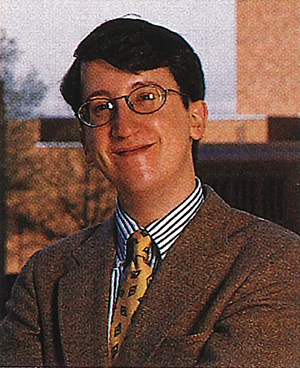 One day, when Classics The poem in question was one in which Horace was ranting and raving to his ex-girlfriend about how badly she had treated him. He wanted to know who her new boyfriend was because the poor man would surely rue the day he’d met her. It was an example of the “real Latin” Mechley likes to offer beginning students who spend most of their time laboring over cases and verb declensions—and just one example of why he is a winner of the 1997 Excellence in Teaching Award given to outstanding TAs.
One day, when Classics The poem in question was one in which Horace was ranting and raving to his ex-girlfriend about how badly she had treated him. He wanted to know who her new boyfriend was because the poor man would surely rue the day he’d met her. It was an example of the “real Latin” Mechley likes to offer beginning students who spend most of their time laboring over cases and verb declensions—and just one example of why he is a winner of the 1997 Excellence in Teaching Award given to outstanding TAs.
“I want to be rigorous in my teaching, but I also want to inject some humor,” Mechley says. “I knew that poem wasn’t what students think of as Latin poetry, which is why I wanted them to read it. I want them to see a range of expression and a range of attitudes, to see what ancient culture and ancient thought processes were like.”
Doing so evidently doesn’t take away from their learning the language. Classics Professor Catherine Connors, who supervised Mechley in his Latin teaching, had this to say: “Brady is simply a superb teacher, the very best I have supervised here. He is exceptionally clear and lively as an instructor. I have also realized in teaching his former students in the upper levels of Latin, that when students learn their basics from him, they never forget!”
A native of Cincinnati, Mechley earned his undergraduate degree at Holy Cross College in Worcester, Mass., where he was the recipient of the Henry Bean Classics Scholarship. In addition to Latin, he has taught Greek, epic poetry and Classics 101, a vocabulary class. He hopes to finish his doctoral degree in 1998 and move on to a faculty position “at an institution that values teaching.”
Mechley is modest about his classroom accomplishments. “I really believe in what I’m teaching,” he says. “I believe that if you present it in a lively and enthusiastic way, the material itself will do the rest of the work.” —Nancy Wick, UW Office of News and Information
Ann Streissguth
Outstanding Public Service Award
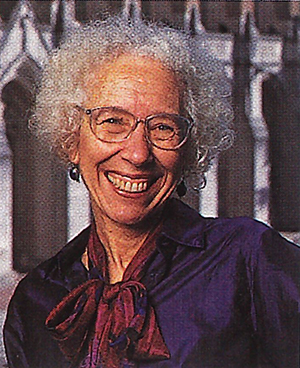 It’s been nearly 25 years since Ann Streissguth evaluated eight children born to alcoholic mothers. She’d been asked to see the group by her colleagues in the Department of Pediatrics, David Smith and Kenneth Jones.
It’s been nearly 25 years since Ann Streissguth evaluated eight children born to alcoholic mothers. She’d been asked to see the group by her colleagues in the Department of Pediatrics, David Smith and Kenneth Jones.
“I still remember being just absolutely stunned by the damage these kids showed. I’d been evaluating kids for years—kids who had been born into poverty, kids with physical disabilities, normal kids—but this kind of damage was more organic.
“I went back and said: `Do you really think this damage is from alcohol? Surely there must be something in the literature.’ And then I conducted a painstaking literature search, in the days before computers were used, and came up with nothing.”
In 1973, pediatricians Jones, Smith and Christy Ulleland, along with Streissguth, published the first widely circulated paper identifying fetal alcohol syndrome and linking it to alcohol abuse by women during pregnancy.
Ever since, Streissguth has been working on the problem: conducting research, trying to find effective means of prevention, and campaigning for better understanding and services for people affected by the condition.
This year, her work will be honored with the 1997 UW Outstanding Public Service Award.
Although she is internationally known for her research on fetal alcohol syndrome and fetal alcohol effects (less well-defined results of prenatal alcohol exposure), Streissguth is being honored primarily for her dedication to public service and her compassionate work with families and individuals.
Her colleagues in the Fetal Drug and Alcohol Unit, part of the Department of Psychiatry and Behavioral Sciences, estimate that she contributes more than 1,000 hours every year in uncompensated public service activities. She is director of the unit and professor of psychiatry and behavioral sciences.
“She has become friend and mentor to many patients and parents who suffer with the daily practical problems associated with fetal alcohol syndrome. … She makes herself generously available to them when they need her help. She consults with their health care providers, teachers, case managers, attorneys and parents. She advocates tirelessly for the myriad services they require without compensation,” her colleagues wrote in their nomination letter.
Streissguth returns the compliment. “This whole group should be getting this award,” she says. “We have a passionate, dedicated team here. We are particularly grateful to Sterling Clarren, a colleague in pediatrics, for his continuing efforts to make diagnostic evaluations available locally through our clinic.”
After years of work on prevention and public policies supporting prevention, she has turned her attention to the long-term development of affected children as they moved into young adulthood.
In a four-year study completed last year, researchers found that only seven of the 90 subjects lived independently and had steady employment. Half or more of the study subjects had trouble with school (suspended, expelled or dropped out); trouble with the law; confinement in jail or treatment facilities; or inappropriate sexual behavior.
Streissguth noted that in the year before she saw the first group of alcohol-damaged children nearly a quarter-century ago, she had been thinking that she wanted to find a way to make her work as a clinical psychologist more socially relevant. As it happened, what she found was a problem that still engages not only her professional efforts, but much of her personal energy.—Claire Dietz, Health Sciences News and Community Relations
Ron Crockett
UW Recognition Award
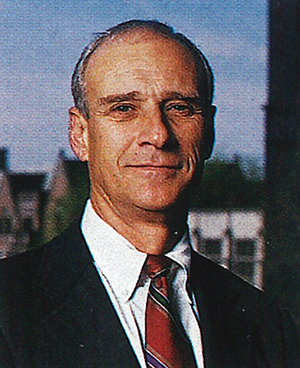 Ron Crockett is well known as the man who brought live horse racing back to western Washington. On a typical day, you’ll find him at Emerald Downs racetrack in Auburn. But each week he also spends five or six hours at the University of Washington, serving on volunteer committees, mentoring students, or cheering Husky sports teams.
Ron Crockett is well known as the man who brought live horse racing back to western Washington. On a typical day, you’ll find him at Emerald Downs racetrack in Auburn. But each week he also spends five or six hours at the University of Washington, serving on volunteer committees, mentoring students, or cheering Husky sports teams.
“Ron has great ideas, and he has a way of figuring out what will make those ideas work,” says UW Athletics Director Barbara Hedges. She’s not the only person on campus who benefits from his advice. In addition to serving on the Tyee Board of Advisors and helping to raise funds for athletics, Crockett volunteers for the business school, where he helped develop the Program in Engineering and Manufacturing Management as well as the Program in Entrepreneurship and Innovation. His past volunteer roles include serving for six years on the UW Foundation Board of Directors and chairing the Foundation during 1994-95, when private support reached a then-record $127.8 million.
For his dedication to the University, Crockett will receive the 1997 UW Alumni Association Recognition Award.
Crockett, who graduated with a B.S. in mechanical engineering in 1962, initially stayed connected to the UW as alumni advisor to his fraternity (Phi Gamma Delta). He still loves meeting students, and has been a mentor for athletes and business students. These interests are reflected in his gifts to the UW. He has donated more than $1 million for endowed scholarships in business and engineering, to support programs he’s involved with, and for new athletic facilities.
When asked why he supports the University, Crockett goes back to his student days when he received the Thomas McCurdy Scholarship. “I worked during college, but that scholarship certainly made my life a lot easier,” he says. “My favorite thing to do for the University always ties back to scholarships, helping someone who would not otherwise have the dollars to complete their education.” He does that, and a lot more.—Antoinette Wills, UW Office of Development
Carver Gayton
UWAA Distinguished Service Award
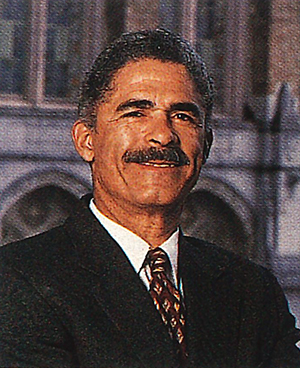 Barely into his new job as state labor commissioner, Carver Gayton, ’60, ’72, ’76, faces a vexing situation. “I’m not sure how I will find all the time to devote to the UW and UW Alumni Association I used to,” he says. “It is been a big part of my life for as long as I can remember.”
Barely into his new job as state labor commissioner, Carver Gayton, ’60, ’72, ’76, faces a vexing situation. “I’m not sure how I will find all the time to devote to the UW and UW Alumni Association I used to,” he says. “It is been a big part of my life for as long as I can remember.”
No doubt he will find a way to handle this challenge. Despite a career that has kept him quite busy, Gayton has devoted extraordinary time and energy to his alma mater.
A life member of the alumni association, Gayton currently chairs the UW President’s Club. He served as UWAA president in 1985-86, and has been a member of the College of Arts and Sciences Development Advisory Board, the Tyee Board and the UWAA Advocate Program.
“It isn’t an effort to extend myself,” he says. “It is a labor of love.”
It was a relationship that started early. Though his parents didn’t attend the UW, Gayton has two brothers and two sisters who are UW graduates (one sister, Guela Johnson, worked for the School of Social Work for many years). Growing up in Madrona, he spent many childhood summer days in the Arboretum, catching tadpoles. When he came to the UW, he was much more than a student. He was a three-time letterman in football (playing on the 1959 team that went 10-1 and won the 1960 Rose Bowl) and ran track.
When he left the UW, “I had a yearning to be part of something important,” he says. He was active with the UW Office of Minority Affairs and the Educational Opportunity Program, which got off the ground in the early 1970s. He was a founding member and remains an adviser to the UWAA’s Multicultural Alumni Partnership and the UWAA Board of Trustees Diversity Committee.
During a long a career at Boeing, his connections to the UW grew stronger. As director of training and educational relations and later director of college and university relations, he worked closely with the UW on a variety of programs. In his spare time, he maintained his busy University volunteer work.
“My volunteer work was often an extension of what I did for Boeing,” he says. Part of his drive is his passion for education and what it can provide for underrepresented populations. Before coming to Boeing, he was a public administration professor at Florida State University and director of affirmative action and staff training at the UW.
“For as long as I can remember, I have had so much admiration for the UW,” Gayton says. “It held it in awe. Being able to serve the University is a small gesture.”
For the time being, anyway, Gayton, a father of four, intends to commute from his Seattle home to his new job in Olympia. A new, big job and a long commute undoubtedly will cut into his time. “But serving the alumni association is critical if we are to maintain the University’s excellence,” he says. “The alumni association provides such important support to the UW, and that support must be strengthened if we are to continue to provide opportunities to everyone.”—Jon Marmor